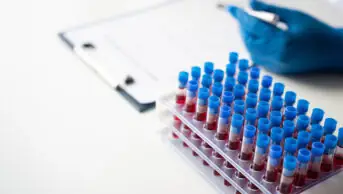
TEK IMAGE / SCIENCE PHOTO LIBRARY
Pharmacists have been invited to contribute their views on how genetics can be used in clinical practice to better tailor prescribing in the UK.
The short online survey is part of the NHS ‘Progress programme‘, the first pilot in the UK to introduce genetic testing before prescribing in primary care, initially at four GP surgeries in the north west of England.
William Newman, professor of translational genomic medicine at the University of Manchester, which is leading the programme, confirmed to The Pharmaceutical Journal that the pilot began at two GP practices — one in Manchester and one in Liverpool — in early July 2023, with two more GP surgeries expected to join.
The pilot has been developed to test the feasibility of rolling out pharmacogenomic testing for patients taking statins, antidepressants and proton pump inhibitors, to ensure they are receiving the right drug and are not being put at risk of side effects.
As part of the pilot, the survey for healthcare professionals, including pharmacists, GPs and hospital doctors, introduces the concept of pharmacogenetics and presents a series of hypothetical options that participants are asked to choose between.
John McDermott, genetics speciality registrar and honorary clinical lecturer at the Manchester Centre for Genomic Medicine, who helped produce the survey, said: “By working with healthcare professionals and the public, the ‘Progress programme’ hopes to implement pharmacogenetics within routine practice.
“Over the past decade, we have learned how common genetic variation can influence an individual’s response to medicines, and evidence-based guidelines to support pharmacogenetic-guided prescribing are now available.
“Despite this, in the NHS, implementation is limited to a small number of drug-gene pairs. This is typically carried out reactively, where variants in single genes are tested at the point of prescription. The NHS, via the ‘Progress programme’, is currently looking to develop an alternative strategy for implementation, co-designed with clinical and public stakeholders.
“The ‘Progress programme’ has validated a panel-based test and created an approach which aims to automatically move the results into a format which is understandable by healthcare professionals who have not had formal training in genetics,” he added.
In a statement on its website, Community Pharmacy England said: “Pharmacists will play a significant role in the development of any future pharmacogenetic programme, and their involvement in its development will be critical to its success.”


